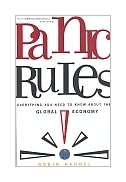|
||
• wydawnictwa polskie
• Zamów informacje o nowościach z wybranego tematu • kontakt
• Cookies na stronie |
PANIC RULESHAHNEL R.wydawnictwo: CAMBRIDGE , rok wydania 1999, wydanie Icena netto: Panic Rules FOREWORD by Jeremy Brecher A funny thing happened on the way to the New Millennium: the Old Millennium crashed. According to economist Paul Krugman, "Never in the course of economic events not even in the early years of the Depression has so large a part of the world economy experienced so devastating a fall from grace." If you leaf back through the writings of mainstream economists and media pundits over the past decade, you will discover that such a global economic crisis couldn't happen, that it wasn't happening, that it wasn't as bad as people said, that it probably was a good thing in the long run, and that, anyway, it's over. If you want to escape this miasma of denial, read Robin Hahnel' s Panic Rules! In contrast to all the ballyhoo celebrating the "new global economy," Hahnel shows that for most people, globalization wasn't so cool even before this Pre-Millennial Meltdown. From 1980 to 1995, per capita GDP (Gross Domestic Product) grew less than 1 percent per year worldwide with most of the gains going to the already rich. For every NIC (Newly Industrializing Country), there were ten of what Hahnel ironically dubs "FEBs" countries Falling Evermore Behind. And for everyone growing wealthy on rising stock prices, profits, and high salaries, there were ten victims of downsizing and declining real wages. Hahnel, himself an economist, challenges the economic dogma that unregulated markets, free trade, and globalization necessarily improve global economic efficiency, let alone that they must lead to benefits for all. Since the market doesn't charge firms for the environmental and social damage they do, unregulated markets give them an incentive to dump their wastes as cheaply as they can and to drive small fanners off the land, even if they then have to live in squalor in already bursting cities. Conversely, the market doesn't give individual firms an incentive to invest in education or health care, even if these are far more "efficient" means of creating well-being for society as a whole than producing sports utility vehicles. Hahnel presents a theoretical case that, under free-trade conditions, even if there are "efficiency gains" from trade as each country specializes in what it does best, the lion's share of any gains from trade are likely to go to the wealthier trading partners, thereby aggravating global inequality. And in reality, this is just what has been happening in the era of globalization. A comparison of 56 countries shows that the spread in GDP per capita between the richest and poorest increased from 40:1 to 72:1 between 1973 and 1992. Just in the past four years, the world's 200 richest people have doubled their wealth, while the number of people living in absolute poverty has increased by 200 million 124 pages Księgarnia nie działa. Nie odpowiadamy na pytania i nie realizujemy zamówien. Do odwolania !. |


